When Sarah saw a post on social media from her local shelter about Eve and Malachi, a pair of six-week-old cats with cerebellar hypoplasia (CH), she felt compelled to help the adorable special needs kittens. “The video they shared of them was too cute and I knew immediately I needed to pull them,” remembers Sarah, so she offered to foster them.
View this post on Instagram
While the tabby and white kittens looked very similar to one another, Sarah learned they were not actually siblings, and when she brought them to her home in Destin, Florida, on June 24, 2019, it wasn’t hard for her to tell them apart.
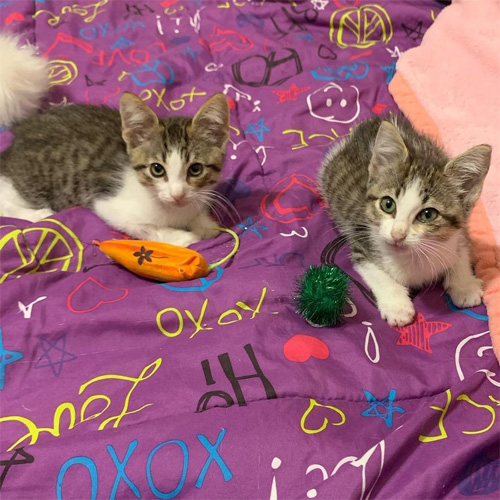
Not only did the kittens have cerebellar hypoplasia, a non-progressive neurological condition that affects balance and coordination, they were both sick, but to differing degrees. “Eve didn’t really play much; she was a lot worse off than Malachi,” explains Sarah. “But Mal knew he was home right away and acted like he’d always been here with us.”
View this post on Instagram
Despite being unwell, both of the kittens were very sweet and affectionate, but Sarah still made sure to give them plenty of time to adjust to their new environment. Not surprisingly, Malachi — who was the healthier one of the pair — settled in quickly, while it took Eve — who had had a very difficult start in life — a little longer to acclimate to Sarah’s home. “Eve’s story before she came to me is that she was found in the street by a kind woman walking her dog who at first glance thought she was dead,” explains Sarah. “She was so small and sick.”
View this post on Instagram
Thankfully, the woman rescued Eve, thinking she may have been poisoned, and immediately took her to the shelter for help. At the shelter, Eve was diagnosed with cerebellar hypoplasia, which occurs in utero, often when a pregnant cat’s unborn kittens are exposed to a virus like feline panleukopenia. “It’s a virus that can be prevented by vaccines,” says Sarah. “This is why it is so important that we trap, neuter, and release stray cats so they can be vaccinated and so they don’t create sick kittens — or any kittens at all!”
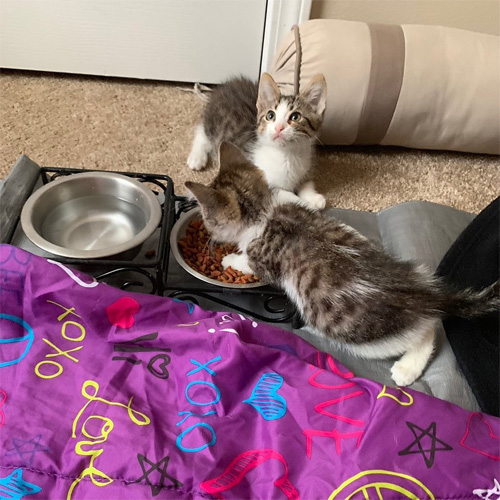
Two days after rescuing Eve, the woman returned to the shelter to foster the little special needs kitten, which is when she met Malachi, who had also been diagnosed with cerebellar hypoplasia. At the time, Eve and Malachi were both four weeks old, so the woman decided to foster both of them. “We don’t have any info on Malachi’s life before he was at the shelter,” says Sarah, “but we know his big personality was a favorite with all the ladies working at the shelter.”
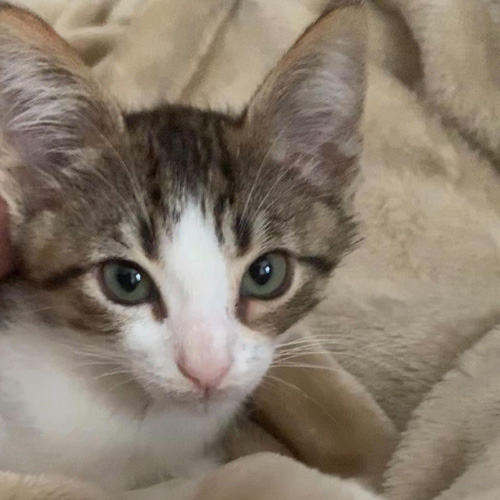
In their initial foster home, Eve and Malachi formed a very close bond, so by the time they arrived at Sarah’s home, they were inseparable. In fact, while Sarah worked hard to nurse Eve back to health, she believes Malachi also played a huge role in her recovery. “I know he helped Eve pull through her toughest battles with his love,” says Sarah.
View this post on Instagram
Just a few weeks later, Sarah was smitten with the pair, and she knew she wanted to adopt them. However, she had to wait several months until they were both healthy enough to be spayed and neutered before she could make it official, but Sarah’s patience eventually paid off. “They were too precious and I knew they were meant to be mine forever,” says Sarah, and Eve and Malachi’s original foster mom obviously agreed, because she covered both of their adoption fees. “They were literally a gift to us in every way.”
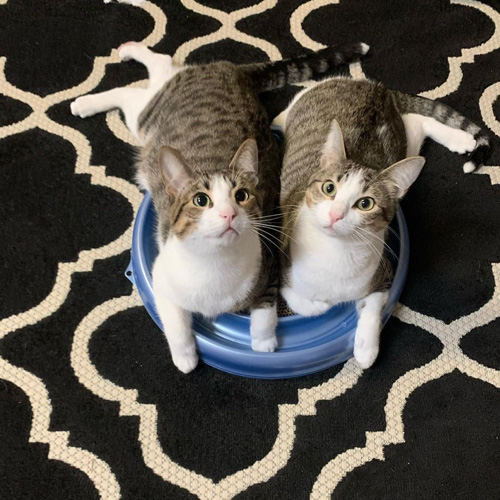
Nearly two years after Sarah brought them home, Eve and Malachi are both happy and healthy, although her cerebellar hypoplasia is moderate while his is more mild. “There are varying degrees of CH — mild, moderate, and severe,” explains Sarah. “He stumbles and falls at times but is slow and steady with his pace. She stumbles over a lot more than him and tries to run through the house like a Tasmanian devil when she’s excited, which usually looks like her throwing herself around as fast as she can because she’s determined.”
View this post on Instagram
Consequently, Eve and Malachi have both suffered a few injuries over the past two years, including chipped teeth and bloody noses, so Sarah has made some adjustments to her home to make it safer for this special pair. Not only has she covered most of her tiled floors with large area rugs, making it much easier and safer for Eve and Malachi to get around, she’s gotten rid of all of her tall cat trees. “They have the same instincts and desires as all other cats,” says Sarah, “so I have to make sure they don’t have access to spaces they could fall far from because they do not have the ability to land on their feet.”
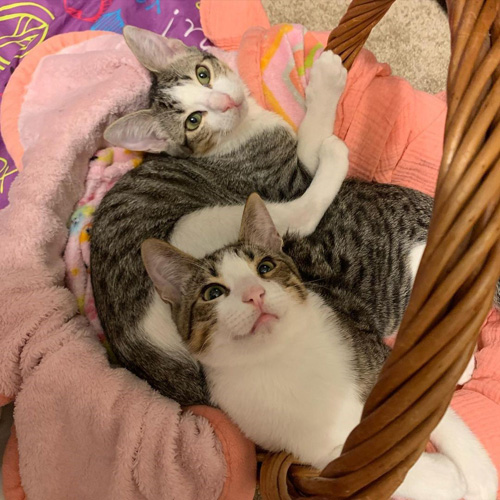
In order to make it easier for Eve and Malachi to eat and drink, Sarah also got raised bowls for them, but she hasn’t had to make a lot of other special accommodations for this adorable pair. In fact, while people often assume cats with cerebellar hypoplasia must be suffering, that definitely isn’t the case for Eve and Malachi — or the vast majority of CH cats. “Often disabled animals are never even given a first chance before being euthanized,” says Sarah. “We want to change that!”
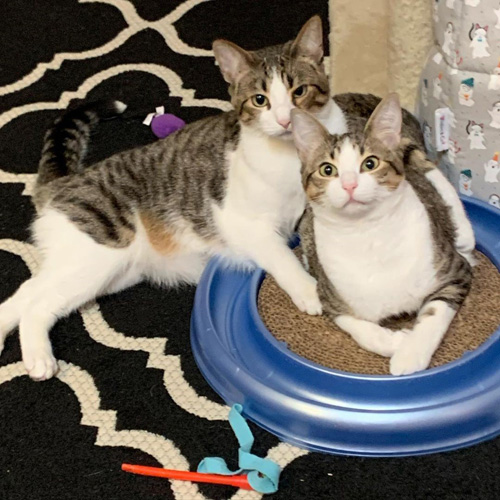
Sarah has also encountered well-meaning people who praise her for caring for Eve and Malachi, often implying it is a burden they would be unable to bear. While she understands this sentiment, as a woman with Ehlers-Danlos syndrome — a group of inherited disorders that affect connective tissues — Sarah hopes more people will realize animals and people with special needs are worth any extra assistance they might require. “As a disabled woman myself, it speaks volumes to me about how we as a society view disability,” explains Sarah.
View this post on Instagram
After all, while they might move a bit differently from typical cats, Eve and Malachi are just as happy and active as their more able-bodied counterparts. They adore chasing after one another and their adoptive siblings, and they like bird watching and trying to catch the red dot. “They do not think they are any different than our other two cats,” says Sarah, but she has to admit there’s one way Eve and Malachi differ from average felines. “I have owned many cats all my life, and CH cats actually seem to have a particularly sweet, affectionate, and happy disposition despite their challenges in life.”
View this post on Instagram
In fact, when they’re not playing with one another, Eve and Malachi love being with their mom, whether they’re snuggling with Sarah on the couch or simply following her around the house. As a result, Sarah shares a very deep and special bond with both Eve and Malachi, and she believes this unique relationship is more than worth any additional time and effort they need to thrive. “Special needs cats repay you for the extra care that they require with so much love and with an intense bond and devotion for their caregivers,” says Sarah. “They are so affectionate and thankful for any help they receive.”
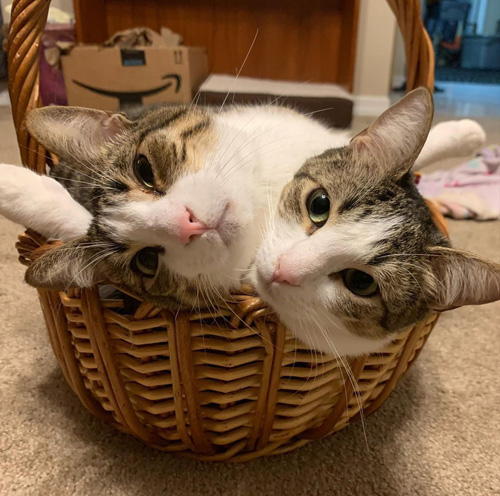
When Sarah offered to foster Eve and Malachi nearly two years ago, she wasn’t planning to adopt them, nor did she realize the tremendous impact they would have on her life. However, now it’s impossible for Sarah to imagine her home or family without them, and she considers herself lucky to be their mom. “They have changed my whole life,” says Sarah. “I love them like they are my children. They are among the top priorities in my life and every day I wake up excited to love them, see their shining faces and shaky booties. Malachi and Eve mean everything to me.”
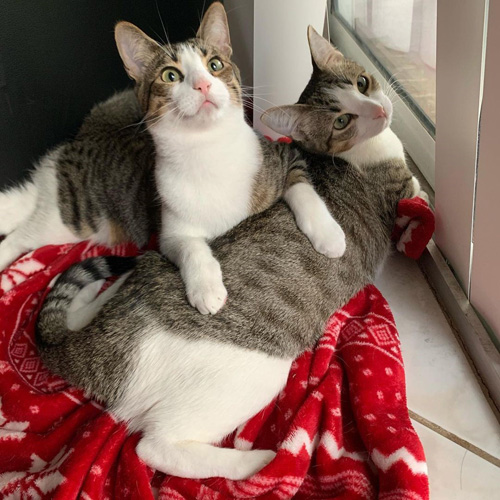
To learn more about these adorable cats, you can follow Malachi and Eve on Instagram.


